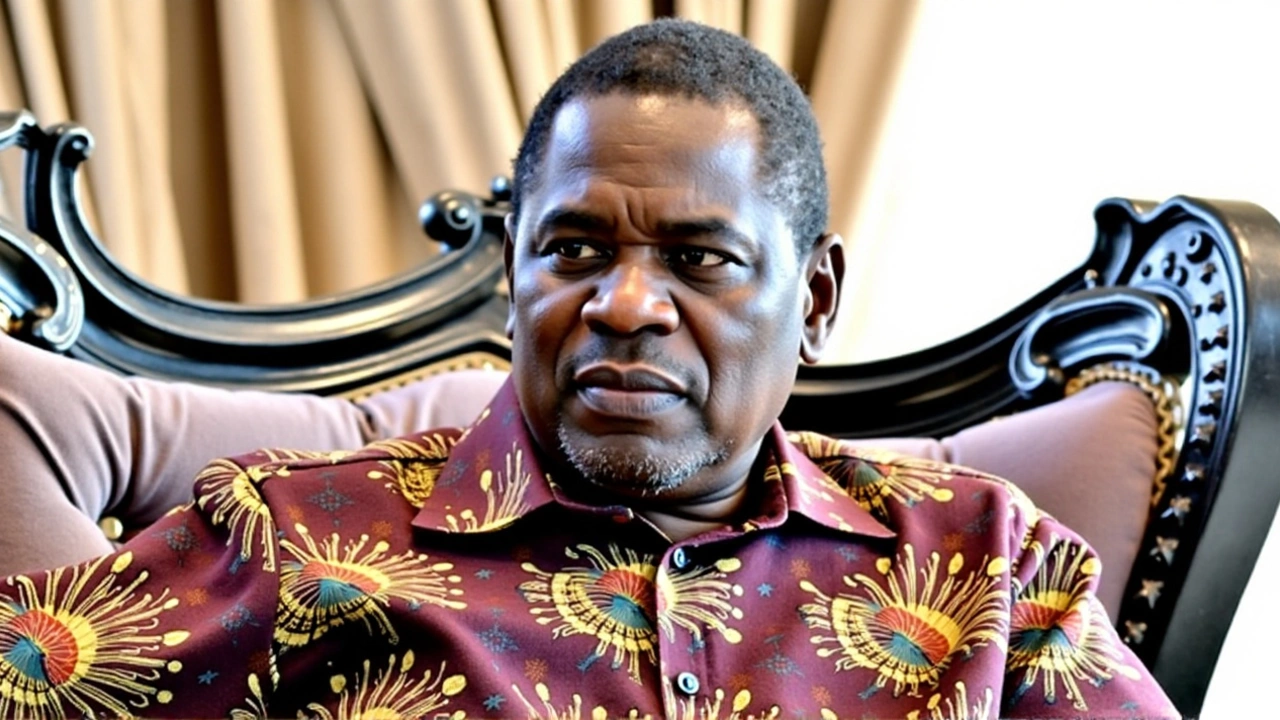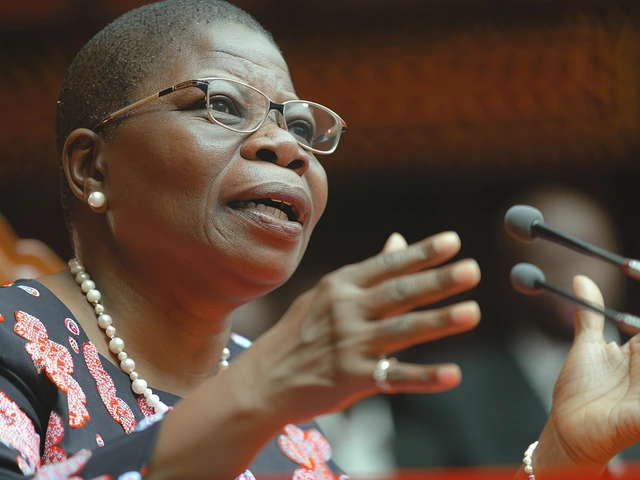
The Unfortunate Incident at N'waMitwa Village
In a startling turn of events this past Saturday, South African Deputy President Paul Mashatile experienced a significant health scare while addressing a public gathering. The 62-year-old deputy president was in the midst of delivering a keynote speech at the 16th anniversary celebrations of N’waMitwa Day in N'waMitwa Village, located outside Tzaneen, Limpopo. As the crowd gathered to listen to Mashatile's address, the concerning incident unfolded, casting a shadow over what was meant to be a joyous occasion.
Temperatures in Tzaneen soared to a scorching 37 degrees Celsius that day, creating an oppressive and potentially hazardous environment for anyone outdoors for an extended period. As Mashatile neared the end of his speech, he suddenly began to exhibit signs of distress. Without much warning, he collapsed on the podium, sending shockwaves through the assembled attendees.
Immediate Response and Speculations
The rapid and professional response from the event's medical team likely prevented the situation from worsening. Among those rendering aid was Limpopo Premier Phophi Ramathuba, who was immediately at Mashatile's side. According to Premier Ramathuba, the deputy president’s collapse was primarily attributed to dehydration, exacerbated by the extreme heat. She clarified that Mashatile does not suffer from any underlying medical conditions that might have contributed to this incident. After ensuring that his vitals were stable, Ramathuba reassured the public that Mashatile was in good spirits despite the scare.
Following the incident, Mashatile was transported to a local hospital for further medical assessment. His spokeswoman, Keith Khoza, addressed the media to provide an update, insisting that earlier reports suggesting Mashatile had fainted were inaccurate. Instead, Khoza emphasized that the unrelenting high temperatures likely played a significant role in the deputy president's symptoms. The statement aimed to calm public concerns while reaffirming that Mashatile was under competent medical care.
The Significance of N'waMitwa Day
N'waMitwa Day holds substantial cultural and social significance, particularly for the women of the region. The event commemorates the advocacy work of Her Royal Highness Hosi, Dr. N’waMitwa the Second, who has been a leading voice for women’s rights and the embodiment of constitutional principles such as gender equality and non-sexism. Held annually, this celebration brings together locals and dignitaries alike to both honor Dr. N’waMitwa's contributions and reinforce the ongoing struggle for women's rights.
Given the event's importance, the unfortunate health scare involving Deputy President Mashatile was particularly jarring for those in attendance. The event was supposed to be a tribute to progress and a celebration of resilience, yet it became a stark reminder of the vulnerability of even the most prominent figures when faced with severe environmental conditions.
Public Concerns and Overall Health
Understandably, the incident sparked public concern regarding the general health and well-being of Deputy President Mashatile. However, assurances from both his medical team and spokeswoman have helped to alleviate these worries. Those close to Mashatile reiterated that beyond the incident itself, he remains a healthy individual without significant health issues.
Nonetheless, the situation has drawn attention to the importance of maintaining health and adequate hydration, especially during public events held in severe weather conditions. It serves as a critical reminder for organizers of such gatherings to have ample emergency medical services on standby and to ensure hydration stations are readily available for attendees. As climate change continues to drive temperatures higher worldwide, incidents like these may become more frequent, demanding better preparations to avert potentially life-threatening situations.
Focus on Future Precautions
In the aftermath of the incident, there are likely to be increased precautions and better planning for future events involving high-profile individuals. The episode has underscored the non-negotiable nature of precautionary measures and the need for adequate medical readiness at all public assemblies. Hydration, regular health check-ups, and immediate access to medical assistance are essential for ensuring the safety and well-being of speakers and attendees alike.
In the realm of public service, high-pressure situations are commonplace, but the need to prioritize health cannot be overstated. While the work undertaken by leaders like Deputy President Paul Mashatile is of immense importance, their well-being is vital for them to continue serving effectively. The close call at N'waMitwa Day serves as a potent reminder of this balance.
The public's response has also been one of deep empathy and concern, elements that are themselves supportive for anyone experiencing such a health crisis. The outpouring of good wishes and the swift actions of medical professionals exemplify the community's commitment to looking out for one another.
Community Reaction and Looking Forward
In the days following the incident, community reactions have been largely supportive and empathetic. Many have used the opportunity to discuss broader themes around public health and safety during large gatherings. The discourse has also brought to light the remarkable resilience and composure shown by both Mashatile and the organizers in the face of an unexpected medical emergency.
Future N'waMitwa Day celebrations are likely to incorporate these learnings, ensuring even more robust measures are in place. The event itself remains a vital platform for advocating for women's rights and advancing the cause of gender equality. It is a celebration that stands as a testament to the progress that has been made and the work that still lies ahead. In acknowledging this, it also underscores the importance of ensuring the safety and well-being of all participants and attendees.
The health scare experienced by Deputy President Paul Mashatile is a story that touches on several important issues: health care readiness, the impacts of climate change, public service responsibilities, and the enduring effort toward gender equality. As we reflect on this event, it serves as a call to better prepare for the challenges that lie ahead, ensuring that our leaders and communities remain healthy, safe, and resilient in the face of adversity.
12 Comments
Write a comment
More Articles

Ecuador and Venezuela Clash: Copa America 2024 Match Preview, Analysis, and Predictions
An in-depth preview of the Copa America 2024 match between Ecuador and Venezuela. The analysis covers both teams' recent performances, key players, strategies, and head-to-head records. Ecuador is expected to win with a predicted score of 2-0, given their strong squad and Venezuela's inconsistent form. Expert insights for football enthusiasts are included.

How to Watch Slovakia vs Romania Live for Euro 2024: Streaming and Telecast Options
The Euro 2024 match between Slovakia and Romania, crucial for both teams in Group E, will kick off on June 26 at Frankfurt Arena, Frankfurt. Slovakia can secure at least third place with a draw, while Romania has the edge due to goal difference. The match starts at 9:30 PM IST and will be available on the Sony Sports Network and the SonyLiv app.

Oby Ezekwesili Upholds Old National Anthem Amid Controversy over New Version
Former Minister of Education, Oby Ezekwesili, firmly opposes the newly signed national anthem endorsed by President Bola Tinubu. She pledges to continue singing the old anthem despite the new legislation. This move has sparked widespread debate on patriotism and the country's priorities amid economic challenges.
Gaurav Bhujade
September 15, 2024 AT 17:42Dehydration is a silent risk, especially when speakers stand for long periods in temperatures above 35°C. The medical team’s quick action likely prevented a more serious outcome. Organisers should always set up water stations and encourage frequent fluid intake. This precaution is simple but can save lives.